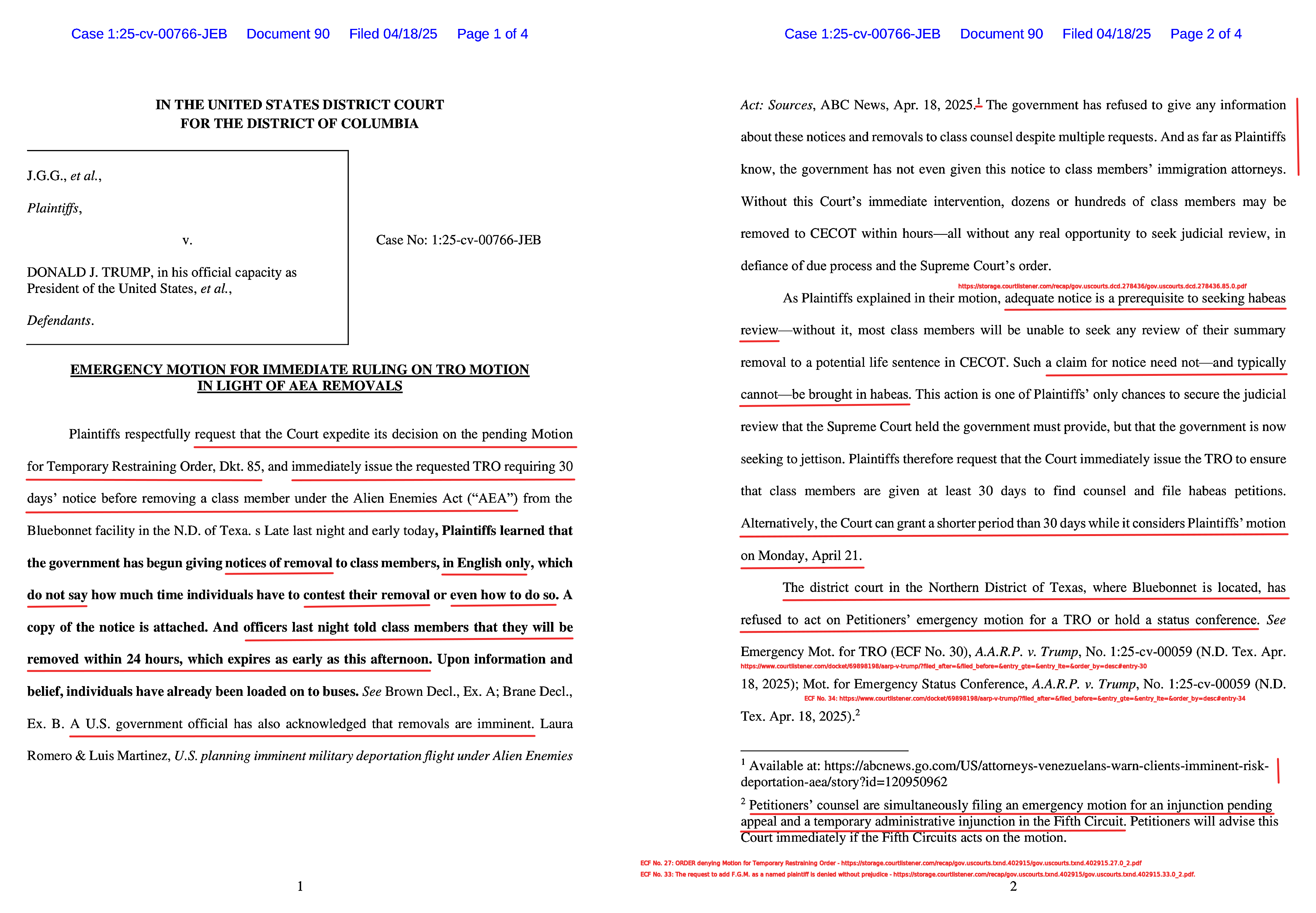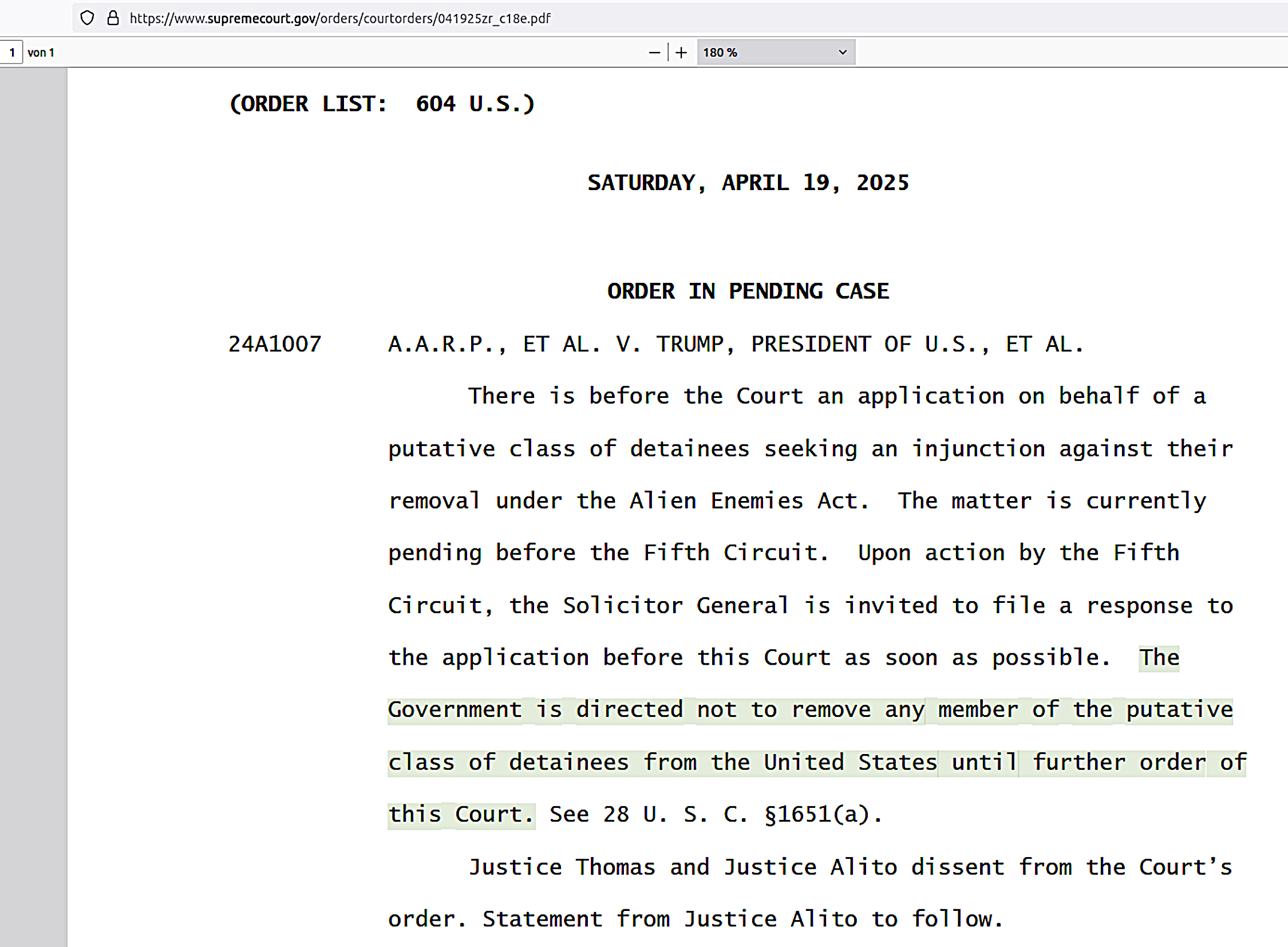Diejenigen, die direkt zur Supreme Court-Entscheidungen wollen, scrollen bitte zu Abschnitt 7.
1. Neuer Schriftsatz für das ursprüngliche Washingtoner Verfahren
In einem neuen Schriftsatz für das ursprüngliche Washingtoner Verfahren vor Richter Boasberg wegen des Alien Enemies Act und der Tren de Aragua-Proklamation heißt es:
„Late last night and early today, Plaintiffs learned that the government has begun giving notices of removal to class members, in English only, which do not say how much time individuals have to contest their removal or even how to do so. A copy of the notice is attached. And officers last night told class members that they will be removed within 24 hours, which expires as early as this afternoon. Upon information and belief, individuals have already been loaded on to buses. See Brown Decl., Ex. A; Brane Decl., Ex. B. A U.S. government official has also acknowledged that removals are imminent.“
(https://storage.courtlistener.com/recap/gov.uscourts.cadc.41957/gov.uscourts.cadc.41957.01208731409.1.pdf, S. 1; Hyperlinks hinzugefügt)
Für den letzten Satz im Zitat wird dieser CBS-Bericht als Quelle genannt:
„A U.S. official tells ABC News that there is planning underway for an imminent U.S. military deportation flight under the Alien Enemies Act.“
(https://abcnews.go.com/US/attorneys-venezuelans-warn-clients-imminent-risk-deportation-aea/story?id=120950962)
Auf S. 2 der Emergency Motion heißt es:
„This action is one of Plaintiffs’ only chances to secure the judicial review that the Supreme Court held the government must provide, but that the government is now seeking to jettison. […]. The district court in the Northern District of Texas, where Bluebonnet is located, has refused to act on Petitioners’ emergency motion for a TRO or hold a status conference. See Emergency Mot. for TRO (ECF No. 30), A.A.R.P. v. Trump, No. 1:25-cv-00059 (N.D. Tex. Apr. 18, 2025); Mot. for Emergency Status Conference, A.A.R.P. v. Trump, No. 1:25-cv-00059 (N.D. Tex. Apr. 18, 2025).“

https://storage.courtlistener.com/recap/gov.uscourts.dcd.278436/gov.uscourts.dcd.278436.90.0.pdf (4 Seiten)
Auf Seite 3 und 4 sind – außer diesem Schlußsatz:
„The Court should immediately issue the temporary restraining order requiring the government to give each class member and class counsel 30 days’ notice, in both English and Spanish, before taking any action to remove a class member from the United States.“ –
nur noch die Unterschriften.
2. Ein neues texanisches Verfahren
b) aa) Das genannte texanische Verfahren ist auch ein ziemlich neues – nicht das bisher schon bekannte vor dem District Court für den Southern District of Texas (siehe taz-Blogs vom 09.04.2025), sondern nunmehr eines vor dem Northern District of Texas.
Die elektronische Verfahrensakte gibt es dort:
https://www.courtlistener.com/docket/69898198/aarp-v-trump.
Emergency Mot. for TRO (ECF No. 30) ist (noch) nicht allgemein zugänglich:
https://www.courtlistener.com/docket/69898198/aarp-v-trump/?filed_after=&filed_before=&entry_gte=&entry_lte=&order_by=desc#entry-30.
Mot. for Emergency Status Conference ist ECF No. 34; auch diese Motion ist (noch) nicht allgemein zugänglich:
https://www.courtlistener.com/docket/69898198/aarp-v-trump/?filed_after=&filed_before=&entry_gte=&entry_lte=&order_by=desc#entry-34.
bb) Das dortige Verfahren wurde Mittwoch (dieser Woche), den 16. April eingeleitet; am nächsten Tag gab es eine erste Entscheidung:
„The Court asked the government whether it would remove A.A.R.P or W.M.M. pending resolution of their habeas petition. Dkt. No. 8. The United States answered unequivocally, stating that ‚the government does not presently expect to remove A.A.R.P. or W.M.M. under the [Aliens Enemies Act] until after the pending habeas petition is resolved‘ and that ‚[i]f that changes, we will update the Court.‘ Dkt. No. 19 at 13. As a result, the petitioners are not at ‚imminent risk of summary removal,‘ and they cannot show a substantial threat of irreparable harm. Thus, the motion is denied.“
(https://storage.courtlistener.com/recap/gov.uscourts.txnd.402915/gov.uscourts.txnd.402915.27.0_2.pdf, S. 1 [von 10 Seiten])
cc) Am heutigen Freitag gab es eine zweite Entscheidung:
„The request to add F.G.M. as a named plaintiff is denied without prejudice for failure to comply with Federal Rule of Civil Procedure 15. However, the petitioners may file an amended or supplemental petition in accordance with Rule 15 and this Court’s Local Rules adding F.G.M. as a named plaintiff. In the alternative, F.G.M. may file his own habeas petition.“
(https://storage.courtlistener.com/recap/gov.uscourts.txnd.402915/gov.uscourts.txnd.402915.33.0_2.pdf, S. 1 [von 2 Seiten]; Hyperlinks hinzugefügt)
dd) Inzwischen kam noch eine dritte:
„Because the filing of a notice of appeal divests a district court of jurisdiction over those matters, a status conference is unnecessary because the Court cannot act on the motions at issue. The Court therefore denies the motion for an emergency status conference (Dkt. No. 34). […].“
„The Court was aware of the pending motions and was working with utmost diligence to resolve these important and complicated issues as quickly as possible.“
(https://storage.courtlistener.com/recap/gov.uscourts.txnd.402915/gov.uscourts.txnd.402915.41.0.pdf, S. 2 f., 4)
b) Die elektronische Akte für das Appeals Court-Verfahren dazu:
https://www.courtlistener.com/docket/69913684/aarp-v-trump/.
(Zuständig ist der 5. Appeals Court – der gilt hinsichtlich der politischen Implikationen [oder Motive] für juristische Entscheidungen als der konservativste in den USA.)
Nachtrag: Inzwischen hat der 5. Appeals Court entschieden; siehe am Ende Abschnitt 7.
3. Die erste Tren de Aragua-Entscheidung des US-Supreme Court
In der kürzlichen Supreme Court-Entscheidung zu dem Alien Enemies Act und der Tren de Aragua-Proklamation hieß es:
„[…] AEA detainees must receive notice after the date of this order that they are subject to removal under the Act. The notice must be afforded within a reasonable time and in such a manner as will allow them to actually seek habeas relief in the proper venue before such removal occurs.“
(https://www.supremecourt.gov/opinions/24pdf/24a931_2c83.pdf, S. 3)
4. Ein brand-neues Supreme Court-Verfahren
Kyle Cheney (Politico) berichtet:
„JUST IN: The ACLU has gone to the Supreme Court re the Alien Enemies Act. Details TK“
(https://x.com/kyledcheney/status/1913347156087292407)
https://www.documentcloud.org/documents/25902022-24a1007/ (28 Seiten) via Gosh Gerstein (ebenfalls Politico).
Der Antrag und die zugehörige elektronische Verfahrensakte sind jetzt auch auf der Website des US-Supreme Court online:
https://www.supremecourt.gov/Search.aspx?FileName=/docket/docketfiles/html/public\24a1007.html.
Siehe dazu auch noch:
ACLU urges US supreme court to block ‘imminent’ deportations of Venezuelans.
Emergency filing says group of men could be deported on Friday or Saturday without court-ordered judicial review
https://www.theguardian.com/us-news/2025/apr/18/supreme-court-aclu-venezuela
Luc Cohen / Kristina Cooke, Venezuelan migrants ask US Supreme Court to halt ‚imminent‘ deportations
https://www.reuters.com/world/us/venezuelan-migrants-told-imminent-deportation-under-us-wartime-law-2025-04-18/
5. Mündliche Verhandlung vor dem District Court für den District of Columbia
District Court für den District of Columbia hat inzwischen angeordnet:
„Having reviewed Plaintiffs‘ 85 Motion for Temporary Restraining Order and 90 Emergency Motion to Expedite, the Court ORDERS that the parties shall appear for a Zoom hearing on April 18, 2025, at 6:15 p.m.“
(https://www.courtlistener.com/docket/69741724/jgg-v-trump/?filed_after=&filed_before=&entry_gte=&entry_lte=&order_by=desc#minute-entry-422858791)
6. Die mitteleuropäisch-nächtliche Entscheidung des District Court für den District of Columbia
a) Die Entscheidung
„For the reasons discussed in today’s hearing, the Court ORDERS that: 1) Plaintiff’s 90 Emergency Motion to Expedite the Temporary Restraining Order is DENIED; and 2) The briefing schedule for the TRO and the hearing set for Monday, April 21, 2025, at 5 p.m. are VACATED.“
(https://www.courtlistener.com/docket/69741724/jgg-v-trump/?filed_after=&filed_before=&entry_gte=&entry_lte=&order_by=desc#minute-entry-422867484; Hyperlinks hinzugefügt)
b) Berichte
Zum Verlauf der mündlichen Verhandlung habe ich (bisher) nur dies gefunden:
aa) Gosh Gerstein [Politico]
„DOJ lawyer Drew Ensign tells Judge Boasberg no Alien Enemies Act deportation flights tonight and people he spoke to not aware of any plan for flights tomorrow.“
bb) Reuters-Bericht
Der oben verlinkte Reuters-Bericht zu dem Supreme Court-Verfahren legt nahe, daß das gerade Zitierte der ausschlaggebende Grund für die District Court-Entscheidung war:
„‚I’ve spoken with DHS. They are not aware of any current plans for flights tomorrow but I have also been told to say they reserve the right to remove people tomorrow,‘ Justice Department attorney Drew Ensign told a district court in a separate but related case.
In that district court case, Judge James Boasberg denied an ACLU request to block Trump from deporting suspected members of the Venezuelan gang Tren de Aragua.“
https://www.reuters.com/world/us/venezuelan-migrants-told-imminent-deportation-under-us-wartime-law-2025-04-18/
(Die dahinter stehende [juristische] Logik ist, daß es wenn es keinen Streit gibt – hier: die eine Seite versichert, eh nicht das machen zu wollen, was die andere Seite verbieten lassen will -, dann besteht kein Anlaß für eine gerichtliche Entscheidung. – Soweit so vernünftig; allerdings ist fraglich, ob derartigen Versicherungen der Trump-Regierung vertraut werden kann.)
cc) Jetzt kam auch noch ein CNN-Bericht, der einen anderen Eindruck von dem ausschlaggebenden Grund für die Washingtoner Entscheidung vermittelt
„A federal judge in Washington, DC, told lawyers for migrants in Texas who believed the Trump administration is about to swiftly deport them under the Alien Enemies Act that he did not have the power to pause the deportations, even though he was concerned about the administration’s actions.
‚I am sympathetic to everything you’re saying, I just don’t I think I have the power to do anything,‘ US District Judge James Boasberg told a lawyer for the migrants at an emergency hearing Friday night.
Before announcing his decision not to get involved, Boasberg pressed an attorney for the administration on whether it will move forward with the deportations Friday night or Saturday.
Justice Department attorney Drew Ensign told Boasberg that while no flights are planned, the Department of Homeland Security said it reserves the right to remove the migrants on Saturday.
[…].
‚It’s hard for me to say I should inject myself into this controversy given where the issue stands in the 5th Circuit and the Supreme Court,‘ Boasberg said Friday.“
(https://edition.cnn.com/2025/04/18/politics/boasberg-deportation-flights-alien-enemies-act/index.html)
dd) Politico-Bericht:
Ali Bianco / Hassan Ali Kanu, Lawyers rush to Supreme Court over ‘imminent’ Alien Enemies Act deportations. A lower-court judge indicated the case is out of his hands after the ACLU filed a flurry of emergency litigation on Friday.
https://www.politico.com/news/2025/04/18/trump-deportations-alien-enemies-act-00299474
Dieser Bericht vermittelt noch einen anderen Eindruck von dem ausschlaggebenden Grund für die Washingtoner Entscheidung:
„Boasberg said he was deeply troubled by the deportation notices that were given to Venezuelan nationals detained in Texas. Those notices, he said, do not appear to comply with the Supreme Court’s requirement that detainees be given meaningful due process.
But Boasberg declined to issue a restraining order to halt any deportations over the weekend. He said he has no authority to do so under a different part of the Supreme Court’s April 7 ruling, which mandated that challenges to the deportations under the Alien Enemies Act must be filed in the jurisdictions where the individuals are detained. Boasberg sits on the Washington, D.C., federal district court, which often hears challenges to federal policies.“
NACHTRAG von Sa., 19.04.2025, 17:55 Uhr:
ee) thread von Mueller, She Wrote (Allison Gill)
Danach zu urteilen, nennt der Politico-Bericht den ausschlaggebenden Grund für die gestrige Boasberg-Entscheidung:
„Boasberg: the relief you’re asking me to impose seems to be pretty close to what I imposed last time – stop removal without notice. That’s what was vacated.“
(https://bsky.app/profile/muellershewrote.com/post/3ln4oyyqukb2d)
7. Schließlich entschied der Supreme Court vorläufig:
https://www.supremecourt.gov/orders/courtorders/041925zr_c18e.pdf
Das Alito-Statement folgt nicht örtlich nach – ich vermute: Es folgt auch zeitlich nach und muß erst noch geschrieben werden.
Laut Reuters wurde die Entscheidung „early on Saturday“ – „around 12:55 a.m. (0455 GMT)“ (also: 6:55 Uhr MESZ) – veröffentlicht.
8. Vorher erging diese Entscheidung des fünften Appeals Court:


https://storage.courtlistener.com/recap/gov.uscourts.ca5.224134/gov.uscourts.ca5.224134.14.1.pdf.
Wie wir vorstehend sehen, hatte vor der Supreme Court-Entscheidung der 5. Appeals Court nicht inhaltlich, sondern aus prozeduralen Gründen zugunsten der Trump-Regierung entschieden: Die Antragsteller hätte – bevor sie sich an den Appeals Court wandten – dem District Court (nach Appeals Court-Ansicht) mehr Zeit geben müssen, um seinerseits zunächst eine Entscheidung zu treffen. Der Supreme Court scheint demgegenüber mehr Verständnis für das eilige Vorgehen der Antragsteller gehabt zu haben (siehe vorstehend Abschnitt 7.).
9. Das kam gestern auch noch: „US intelligence contradicts Trump claims linking gang to Venezuelan government to speed deportations“ (AP)
„A new U.S. intelligence assessment found no coordination between Tren de Aragua and the Venezuelan government, contradicting statements that Trump administration officials have made to justify their invocation of the Alien Enemies Act and deporting Venezuelan migrants, according to U.S. officials.“
(https://apnews.com/article/trump-alien-enemies-act-venezuela-tren-de-aragua-103919f71db9a9e7a9a3de1028585483)




